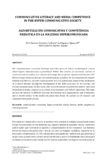Mostrar el registro sencillo del ítem
Communicative literacy and media competence in the hypercommunicative society
| dc.creator | Caldeiro Pedreira, Mari Carmen | es_ES |
| dc.creator | Aguaded Gómez, Ignacio | es_ES |
| dc.date.accessioned | 2016-10-27T09:41:49Z | |
| dc.date.available | 2016-10-27T09:41:49Z | |
| dc.date.issued | 2015 | |
| dc.identifier.issn | 2223-2516 | |
| dc.identifier.uri | https://hdl.handle.net/2454/22516 | |
| dc.description | Enlace a la versión en castellano: https://hdl.handle.net/2454/22548 | es_ES |
| dc.description.abstract | The communicative ecosystem develops and takes place in today’s technological society where hypercommunication is prioritized. Within this context, an enormous number of screens broadcast audiovisual contents that shape the recipients’ opinion and behavior. The different types of faceto- face and virtual interaction, as well as the media maelstrom, require training and literacy, not only communicative but also audiovisual, aimed at the attainment of a critical attitude through the development of the skills necessary for face-to-face and virtual communication. In this sense, this research intends to justify the interest and need for growth of media competence as a form of autonomous and critical expression. This topic attracts the interest of different national and international organizations and institutions, and is closely related to the media education that should be carried out by trainers and communication professionals. | en |
| dc.format.mimetype | application/pdf | en |
| dc.language.iso | eng | en |
| dc.publisher | Universidad Peruana de Ciencias Aplicadas | es_ES |
| dc.relation.ispartof | Revista Digital de Investigación en Docencia Universitaria (RIDU); Vol 9, No 1 (Año 2015). | es_ES |
| dc.rights | © The authors. This article is being published by the Educational Quality Department’s Research Area Revista Digital de Investigación en Docencia Universitaria, Universidad Peruana de Ciencias Aplicadas (UPC). This is an open-access article, distributed under the terms of the Attribution-ShareAlike 4.0 International Creative Commons License, which allows the non-commercial use, distribution and reproduction in any media, provided the original work is properly cited. | en |
| dc.rights.uri | http://creativecommons.org/licenses/by-sa/4.0/ | |
| dc.subject | Communicative ecosystem | en |
| dc.subject | Hyperconnected society | en |
| dc.subject | Literacy | en |
| dc.subject | Media competence | en |
| dc.subject | Critical autonomy | en |
| dc.title | Communicative literacy and media competence in the hypercommunicative society | en |
| dc.type | Artículo / Artikulua | es |
| dc.type | info:eu-repo/semantics/article | en |
| dc.contributor.department | Psicología y Pedagogía | es_ES |
| dc.contributor.department | Psikologia eta Pedagogia | eu |
| dc.rights.accessRights | Acceso abierto / Sarbide irekia | es |
| dc.rights.accessRights | info:eu-repo/semantics/openAccess | en |
| dc.type.version | Versión publicada / Argitaratu den bertsioa | es |
| dc.type.version | info:eu-repo/semantics/publishedVersion | en |
Ficheros en el ítem
Este ítem aparece en la(s) siguiente(s) colección(ones)
La licencia del ítem se describe como © The authors. This article is being published by the Educational Quality Department’s Research Area Revista Digital de Investigación en Docencia Universitaria, Universidad Peruana de Ciencias Aplicadas (UPC). This is an open-access article, distributed under the terms of the Attribution-ShareAlike 4.0 International Creative Commons License, which allows the non-commercial use, distribution and reproduction in any media, provided the original work is properly cited.



